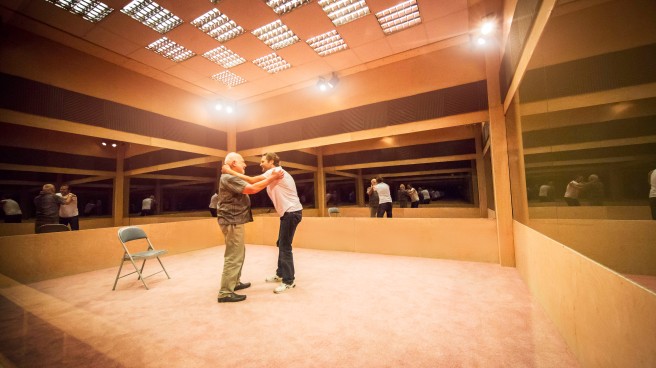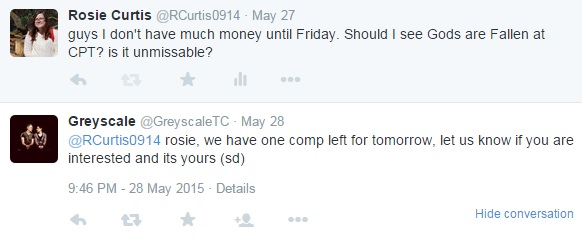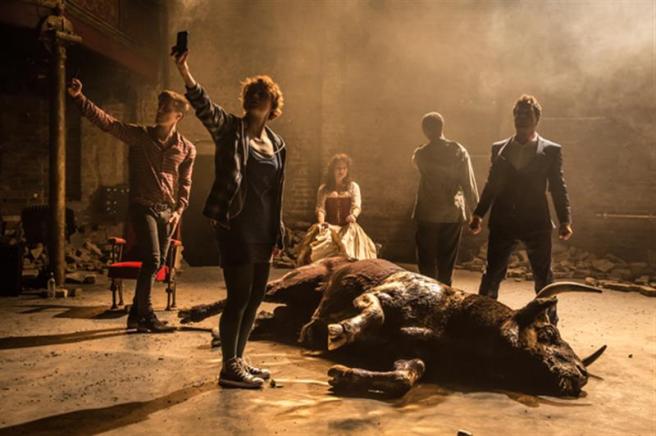
When I started writing this, I started by reading through the wikipedia article about the Beslan school siege. I knew nothing about it, really. But I was 12 when it happened. When I was 10, the twin towers came down and from that point I suppose I had some awareness that the world was big, and sometimes big things happen. But Beslan, 3 years later, drifted by me.
Children’s theatre in the UK, on the whole, is pretty gentle. It’s mostly made with schools in mind, as they provide such large chunks of ticket income, and so it’s reinterpretations of old stories or adaptations of classic books like 90% of the time. Generally, theatre for children is used to reinforce nice messages, like friendship or the importance of being yourself and other lessons from Saved by the Bell. It seems unlikely that Us / Them, which recaps the events of the Beslan school siege from the perspective of two children, would be made in the UK for an audience of nine and up.
There were no children or young people in the audience when I saw Us / Them at Summerhall, so it’s impossible for me to figure out how the piece might actually work for that age range, but I kinda see it. Instead of going over the full context, the children present their blinkered view of the world: where to see ducks, the size of supermarkets, a received impression that all Chechen men are paedophiles. It sets up the piece as playful, actually quite funny in places, and rooted in feeling more than historical accuracy. As a piece for children, it explores the events as possibility – the sort of thing that could happen, does happen – rather than as an abstract occurrence somewhere far off in a different place.
It is amazing. Constructed like a game in the playground, the two characters compete in their storytelling, sometimes racing ahead of each other or making their own version of what happened particularly spectacular. They chalk our their school, spin bomb wires from balloon tails and turn the effects of dehydration into dance. It looks BEAUTIFUL throughout, creating just the right amount of tangled mess. In being created to seem like it has come from the mind of children, it is haunting and affecting, capturing the horror and confusion of the situation without becoming tragedy porn.
There’s some issues, maybe, with presenting this work for financial gain given the subject at hand – and that’s worth flagging and reading a bit about in Andrew Haydon’s review – but there’s also a glimpse into what children’s theatre has the potential for. It is a way of helping young people make sense of the world. There’s a lightness to Us / Them that means it is a gentle nudge into the big wide world, asking difficult questions about otherness and conflict, without trying to fill in the gaps and over-explain a political situation. Children’s theatre can often exist in an idealised world – one of bright colours and happy endings – and there’s a joy in so much of that work, but maybe it could sit alongside some things that encourage children to interrogate and explore the darker side of the world they inhabit. Maybe my 12 year-old-self could’ve gone some way to understanding this, to even knowing it, if the UK could venture towards treating children like they deserve to understand the world.
This is difficult because so much is income driven, and so much is dictated about what is right for children to see by schools and parents – who have far more right to dictate that than I do – so I am aware I’m being a bit ideological here, but, fuck, imagine if we were churning out this sort of challenging, complex and stunning work for young audiences more often.
Of course, as the room of adults watching it and the slew of great reviews suggest, this is a show that is amazing to watch as a grown up – not least because it looks amazing, but because knowing that we live in a world where killing children can be used as political tools, means that the funniness and warmth of the two central characters is shattering.
Summerhall










